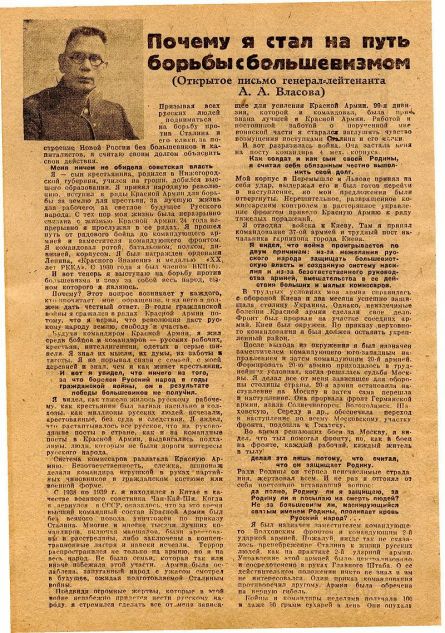On 30 July 1946, the trial of the former Soviet General Andrey Vlasov and his accomplices began in the Military Collegium of the Supreme Court of the USSR, consisting of the chairman Vasiliy Vasilievich Ulrich and members of the collegium F.F. Karavaikov and G.N. Danilov.
The charges:
Terrorist acts against representatives of Soviet power or of workers and peasants organisations (Article 58-8 of the Russian SFSR Penal Code).
Damage of transport, communication, water supply, warehouses and other buildings or state and communal property with a counter-revolutionary purpose (Article 58-9 of the Russian SFSR Penal Code).
Anti-Soviet and counter-revolutionary propaganda and agitation (Article 58-10 of the Russian SFSR Penal Code).
Any kind of organisational or support actions related to the preparation or execution of the above crimes is equated to the corresponding offences and prosecuted by the corresponding articles (Article 58-11 of the Russian SFSR Penal Code).
Treason by military personnel (Article 58-1b of the Russian SFSR Penal Code).
Soviet military commander Andrey Vlasov defected to Hitler’s Germany. He was captured by the Germans in 1942 after the defeat of the 2nd Shock Army which he commanded. Subsequently, he agreed to collaborate with the authorities of the Third Reich and headed the Russian Liberation Army (ROA), as well as the Russian Liberation Movement and the Committee for the Liberation of the Peoples of Russia (from 1944 to 1945). In 1945, he was taken prisoner by Soviet troops.
After the trial, the Soviet press called the defendants “the agents of German intelligence, who perpetrated espionage-sabotage and terrorist activities against the Soviet Union”.
Furthermore, the Decree of the Presidium of the Supreme Soviet of the USSR No 39 of 19 April 1943 “On punishment for German-fascist villains guilty of murder and torture of Soviet civilian population and Red Army prisoners; for spies, betrayers of the nation among Soviet citizens and for their accomplices” was applied to all the defendants.
Source:
The Vlasov case: History of a betrayal in two volumes. Moscow, 2015.
























